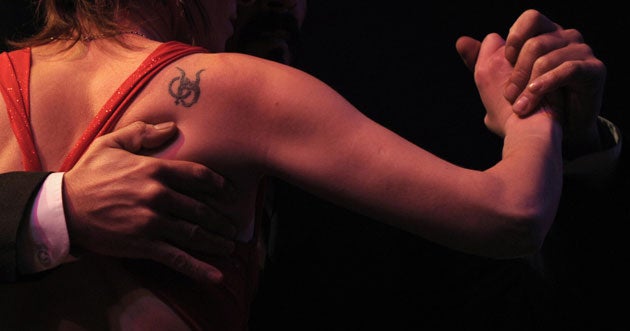It takes two (Argentina and Uruguay) to tango
South American nations put aside longstanding rivalry to champion the dance as world cultural treasure. Andrew Johnson reports

Your support helps us to tell the story
From reproductive rights to climate change to Big Tech, The Independent is on the ground when the story is developing. Whether it's investigating the financials of Elon Musk's pro-Trump PAC or producing our latest documentary, 'The A Word', which shines a light on the American women fighting for reproductive rights, we know how important it is to parse out the facts from the messaging.
At such a critical moment in US history, we need reporters on the ground. Your donation allows us to keep sending journalists to speak to both sides of the story.
The Independent is trusted by Americans across the entire political spectrum. And unlike many other quality news outlets, we choose not to lock Americans out of our reporting and analysis with paywalls. We believe quality journalism should be available to everyone, paid for by those who can afford it.
Your support makes all the difference.It is, as you might expect of its Latin American creators, sexy, passionate and dramatic. Now the tango, which has seduced the world's dance lovers for decades, and enjoyed a worldwide boom over the past couple of years, is to be recognised as one of mankind's greatest cultural achievements.
Unesco, the United Nations cultural heritage body, met last week to consider giving the tango protected cultural status in response to a petition by Argentina and Uruguay, who combined forces despite arguing about exactly where the dance evolved
In Britain, a boom in the number of people taking up the tango has seen clubs springing up from Totnes to Tayside, with thousands of men and women locking into passionate embrace to the often plaintive music of South America.
Such is the global appeal, that dance obsessives from the UK are travelling to Buenos Aires, the disputed home of the dance, which is said to have developed in the city's brothels in the 19th century. Uruguay counter-claims that it gave birth to the tango in Montevideo.
Even less ambitious British fans of the dance are prepared to travel the length of the UK, or to Berlin, Sweden, France, the US, Netherlands and Norway, for a few steps with a master.
Steve Morrall, who organises tango events and lessons for his company, Tango UK, says that numbers have increased steadily over the past four or five years.
"So much so that we've been able to make it our sole income," he adds. "My wife and I spent a month in Buenos Aires a few years ago to immerse ourselves in the culture. Then, two years ago, we hired a ship and took 60 dancers on a tango cruise down the Nile with two resident Argentine maestros."
The former tango world champion Paul Bottomer, who now runs a school called Dance Matrix, says the allure of the dance was its safe intimacy: "There are milongas [tango clubs] every night of the week now in London. There is tango throughout the country. It really is huge. You can feel the emotion of the music. It's a very intimate dance. The hold is called 'The Embrace' and there's a degree of intimacy, but also a huge amount of respect for your partner. It's a dialogue – you improvise the steps within a framework."
Jim Bedford, 73, who lives on Dartmoor, took up the tango six years ago.
"I've just got back from Barcelona, where I go for three months of the year," he says. "I rent a flat there, primarily for tango dancing. I've been to Buenos Aires and all over Europe, but I'll also go to Southampton, Bristol or Oxford for a night's dancing. It's the union of two strangers with the music – and the music and movement is what it's about."
He is also a regular at the Tango Mango festival in Devon, which is held four times a year and attracts thousands of dancers from around the world.
Kim Schwartz, who gave up her legal career in the City to spend four years in Buenos Aires studying dance, is now a teacher based in London.
"When I started eleven years ago in London there were very few teachers," she recalls. "It seemed the sort of thing for eccentrics.
"It is much more mainstream now and you get a whole age range. If you just look at the number of tango teachers these days, you can see it's definitely grown massively. Buenos Aires is the Mecca, but you can go anywhere to dance, from Greece to Germany. People will go for a particular teacher, or just to dance with people outside their normal tango community."
Unesco will make its final decision in September.
Join our commenting forum
Join thought-provoking conversations, follow other Independent readers and see their replies
Comments